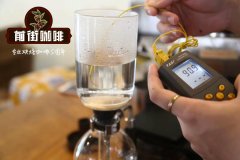A Survey of Coffee in China Catimor Coffee cultivation introduces why there is no boutique coffee in China

Professional coffee knowledge exchange more coffee bean information please follow the coffee workshop (Wechat official account cafe_style)
Overview of Coffee in China
Coffee-Arabica (mainly Catimor) and some Robusta
Flavor-difficult to classify because it varies from region to region and a large part of it is sold as instant coffee. Under ideal conditions, coffee beans are clean, moderately sticky and light acidity.
The main producing area-the western part of Yunnan Province
Height-1000-2000 m
Flowering-May-October
Harvest-November-April
Treatment-by hand picking; wet and dry processing; solarization.
Shipping-year-round
The main buyers-Hong Kong, North Korea, Singapore, Russia, etc., bought for the production of instant coffee. Other buyers including the United Kingdom, Japan, the United States and Belgium also participated in the purchase.
Coffee in China is a mystery that cannot be guessed even to those in the coffee industry. Chinese coffee has always been burdened with a reputation for poor quality. Large companies such as Nestl é, the most common instant coffee, buy Yunnan coffee. Chinese coffee is difficult to classify and even more difficult to understand.
Part of the reason for the inability to understand Chinese coffee is due to Chinese culture, and China's long-standing tradition makes it more challenging for foreigners to understand its coffee. This is a fact, that is, there is no local coffee organization to promote a better understanding of coffee and set industry standards, which is even worse for the development of coffee in China. In addition, for a period of time, Chinese coffee has a well-deserved reputation for unstable coffee cultivation, but fire bumps will certainly emerge. In recent years, Chinese people have also awakened to the development of coffee, and have even begun to improve. "Chinese coffee is generally considered a low-quality product and in many cases is confused with Vietnamese coffee, but this is a very big misunderstanding," said Stuart Eunson, managing director of Arabica coffee shop in Beijing. "in the past 10 years, Chinese coffee growers have made great progress in the quality and sustainability of their coffee cultivation. Although it is still in the stage of development, Chinese coffee has joined the ranks of high-quality coffee, and experienced coffee makers can easily choose the best coffee. "
More than 80% of Chinese coffee is grown in Yunnan, the southernmost inland province in China, which has four or five coffee producing areas, including Ruili and Baoshan. The Robusta species also grows in Fujian, Hainan Island, near the coastline of southern Vietnam.
"Fujian and Hainan now produce very little coffee," Eunson said. "it produces the most in Yunnan and can produce high-quality coffee beans. The local climate, weather and terrain are very suitable for coffee growth, but for any coffee variety, the above three conditions will make the flavor of coffee beans unfathomable.
Traditionally, China brought high-quality bourbon and tin card seeds from Myanmar in the 1950s. But all that has changed. Today, 70% of China's coffee comes from the New Cartimo Coffee Tree, a sturdy but poor-quality hybrid designed to defeat high-quality original coffee varieties. Many coffee giants such as Nestl é provide Cartimo coffee to growers and provide training and incentives.
"the old coffee varieties still exist," said David Roche, who visited coffee areas in China a few years ago and was the chief technical director of the Coffee quality Research Institute. "when I was there, according to what I saw, heard and collected, about 30% of it was probably an old breed. However, I have seen that nearly half of the ancient species have been abandoned because they do not have a good educational background. I don't see some farms growing some old varieties, but they don't take the time to isolate them. "
Although there are no national government statistics on the size of Chinese mainland farms, they can range from very small to as high as more than 5000 mu. Many large-scale private farms have signed contracts with Dagong. In addition, there are a large number of state-owned farms in the country.
Most coffee is treated by wet treatment, and at this point, there is little organic cultivation. "so far, some farms claim to grow coffee organically, but only one has been certified to be organically grown." Eunson said.
China's alpine environment and geographical conditions are ideal for the cultivation of high-quality coffee, but the reality is not satisfactory. On the contrary, the biggest obstacle to boutique coffee in China is that no one thinks that boutique coffee is really fine coffee on the ground, but to sell it as the raw material of instant coffee, and those species are grown as whole grains without care. And it seems that all this will not be changed overnight. CatimorCartimo, which is a pest-resistant and corrosion-resistant coffee, seems to have developed, but it has a low score in the cup test and is difficult to sell. Because in China, few people can tell whether a cup of coffee is good or bad, because few people like to drink high-quality coffee. "there is no coffee culture in this country." Roger said. This reminds him of helping the locals hold a cup test when he was in Baoshan. "I asked them to have less boiling water and showed them how to do a cup test for coffee." He said. "and the eyes of the locals seem to say," what is this idiot doing! " A well-known Yunnan coffee dealer said: "in the local, coffee production and sales are increasing day by day." But he added: "China's tea culture has existed for thousands of years, and coffee is still no substitute for tea culture."
But the encouraging news is that the development of China's coffee industry is springing up. If there is a certain degree of standardization in the cultivation and handling of coffee in China, the consistency of Chinese coffee should be light to moderate, and the bright feeling should be especially clear to moderate, which should be consistent with the characteristics of South American washed coffee. "under ideal conditions, Chinese coffee should be transparent, medium consistency, slightly acidic and so on." Eunson pointed out. "Coffee in China tastes good and should be sold at a good price."
With the joint efforts and promotion of Chinese coffee growers and enthusiasts, the quality of coffee in China will become better and better in the future. "now Chinese growers have realized that the quality of coffee is proportional to its income, so the quality of coffee is improving every year," Eunson said.
In addition, some coffee giants' investment in China has also made immortal contributions to the spread of coffee culture in China. Starbucks, for example, which already has 44 stores in Beijing, is promoting coffee culture in a tea culture country. "more and more Chinese people begin to drink coffee, and in major cities in China, people begin to learn about high-quality coffee through Starbucks." Eunson pointed out.
With the increasing demand for boutique coffee in the world, China may provide boutique coffee to coffee lovers around the world in the near future to get rid of the bad reputation of shoddy coffee countries.
Important Notice :
前街咖啡 FrontStreet Coffee has moved to new addredd:
FrontStreet Coffee Address: 315,Donghua East Road,GuangZhou
Tel:020 38364473
- Prev

Catimorkatimo Coffee History Katim English Catimor Coffee Features
Professional coffee knowledge exchange more coffee bean information please follow the coffee workshop (Wechat official account cafe_style) 1, coffee transmission route outline Ethiopia to Yemen (595850), Yemen to India and Java (1600), Java to the Netherlands (1706), the Netherlands to Paris (1714), Paris to Bourbon (1718) Martinique Island, Haiti (1723)
- Next

Introduction to Arabica Coffee beans and their varieties which species does Catimor belong to?
Professional coffee knowledge exchange more coffee bean information please follow the coffee workshop (Wechat official account cafe_style) is currently the three largest coffee varieties on the market, many of the most commercially valuable boutique coffee beans are Arabica species in the repeated breeding and variety improvement extended many varieties designed to improve disease resistance, yield, environmental adaptability, but if the use of native species
Related
- Detailed explanation of Jadeite planting Land in Panamanian Jadeite Manor introduction to the grading system of Jadeite competitive bidding, Red bid, Green bid and Rose Summer
- Story of Coffee planting in Brenka region of Costa Rica Stonehenge Manor anaerobic heavy honey treatment of flavor mouth
- What's on the barrel of Blue Mountain Coffee beans?
- Can American coffee also pull flowers? How to use hot American style to pull out a good-looking pattern?
- Can you make a cold extract with coffee beans? What is the right proportion for cold-extracted coffee formula?
- Indonesian PWN Gold Mandrine Coffee Origin Features Flavor How to Chong? Mandolin coffee is American.
- A brief introduction to the flavor characteristics of Brazilian yellow bourbon coffee beans
- What is the effect of different water quality on the flavor of cold-extracted coffee? What kind of water is best for brewing coffee?
- Why do you think of Rose Summer whenever you mention Panamanian coffee?
- Introduction to the characteristics of authentic blue mountain coffee bean producing areas? What is the CIB Coffee Authority in Jamaica?

